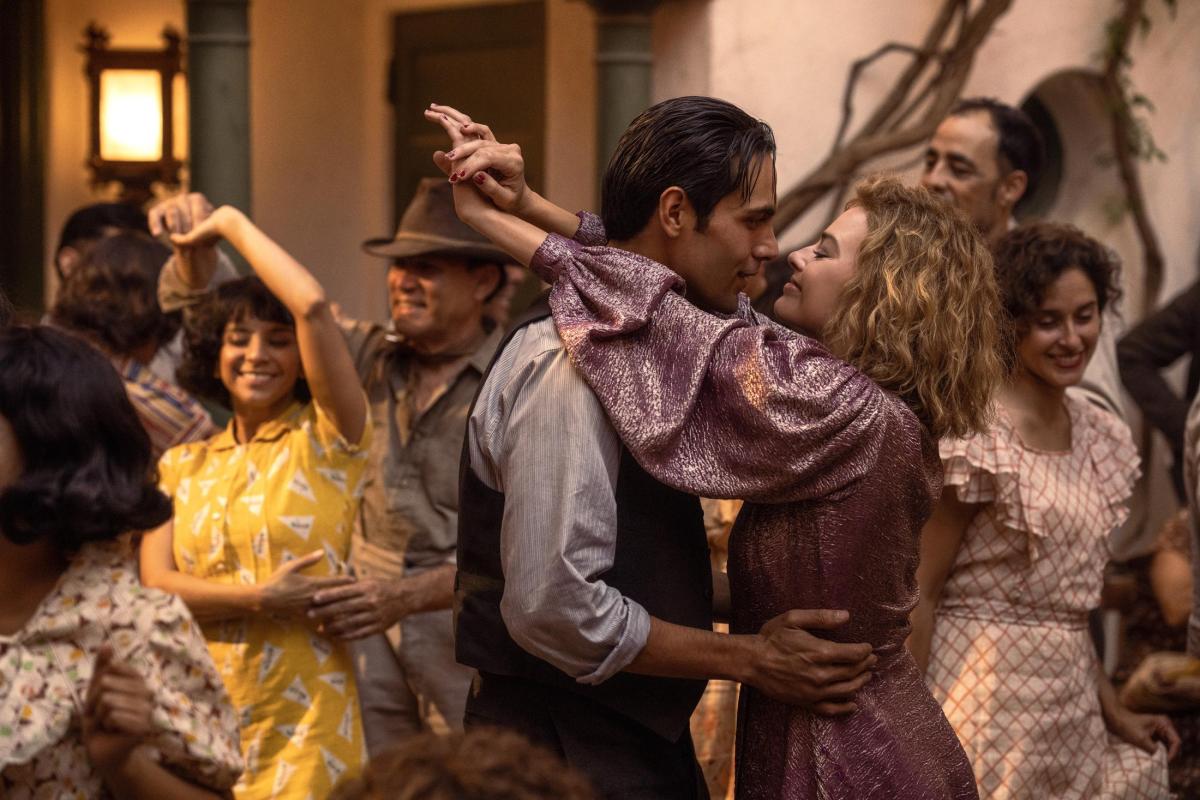
Not five minutes into Babylon and our screen is engulfed in elephant dung. Not just a little elephant dung, mind you, but reams of it, pouring out of the truck that is transporting the elephant, onto the street, and into the face of the luckless man trying to contain it. It’s exceedingly gross and just the first of many gross-outs in Damien Chazelle’s ambitious spectacle about the early days of Hollywood. Moments after the epic elephant excrement, we see a prostitute urinating into a fat, naked man’s mouth. Eventually, the film will give us projectile vomiting, extreme loogie hocking, rat eating, and the sucking of poison out of a gaping wound.
What on earth is Chazelle trying to say here?
The Hollywood in his imagination is a sensory orgy to be sure. That elephant is on its way to a party in the Hollywood hills, where the well-heeled, famous, and/or beautiful snort coke, drink Champagne, have sex, and gyrate uninhibitedly. There is a (sensational) jazz band crammed onto a stage. The elephant eventually strides through. (It’s the only thing that can snap the partiers out of their booze-soaked delirium.) The scene, like so many in Chazelle’s film, is eye-popping, phantasmagoric, and a bit exhausting. (One is tempted to joke that he has managed to make Baz Luhrmann look like a minimalist.) Hollywood was one big bacchanal in its early days, Chazelle is saying. It was brash, confident, and high on its own supply (literally and figuratively).
That still doesn’t explain all the…excretions.
I don’t mean to harp on this—although Chazelle clearly does—but to me, all the gross stuff is a bit indicative of the film’s wild mood swings. Is the film a celebration of old Hollywood—or a condemnation of its excesses? Clearly, a bit of both. (Chazelle has described the film as “hate letter to Hollywood but a love letter to movies.”) But I think this dichotomy never fully comes together.
I should note here that the film is at least partly an homage to Singing in the Rain. That film, like this one, is about the transition from silent film to talkies—how it ruined some careers and built others.
Our heroes here are a Mexican immigrant named Manny (newcomer Diego Calva, recalling a young Antonio Banderas), wannabe starlet Nellie LaRoy (Margot Robbie), and aging matinee idol Jack Conrad (Brad Pitt). Manny has been hired by the Hollywood Hills bigshot to wrangle that elephant (although thankfully it’s not his mouth that receives the elephant offering), and clearly has a knack for making himself useful to important people. He comes across the feisty, beautiful, chaos agent Nellie as she’s trying to sweet talk her way into the party. He lies on her behalf although she tells him she didn’t need his help. “I’m a star,” she tells him. Not because she’s been in any movies yet, but because in her estimation, either you are a star or you’re not. Manny is instantly smitten.
Jack Conrad arrives late, with his soon to be ex-wife (a cameo by Olivia Wilde), who is irritated by both his infidelity and relentless bonhomie. At this point he’s still a big star, although his days are numbered, and he marches through the party like a golden god.
One of the problems with this film is that I’ve seen these archetypes before. Robbie herself, as the wild Nellie, who actually has some talent as an actress until she is done-in by a Jersey accent and a bad coke habit, has played a variation of this very part before—Nellie is kind of a cross between Harley Quinn and Tonya Harding. The aging movie star who watches as his Hollywood disappears before his very eyes? Not only have we seen this character before, we’ve seen it in a recent Brad Pitt film! (Take Leonardo DiCaprio’s Rick Dalton in Once Upon a Time in Hollywood, move the time frame from the 60s to the 20s, and you’ve got Jack Conrad.) And Manny is every male ingenue who rises up the ranks, whether it be in a mafia film or a film about Hollywood.
Which is not to say the performances are bad. They’re quite good. (Although the Australian actress Robbie should maybe put the kibosh on playing American lowlifes for a while.) A still dashing Pitt perfectly embodies the film’s tone, which pivots from broadly comedic to melodramatic. (As the kids say, he always understands the assignment.) And I was thrilled to see the great Jean Smart, playing a wise and all-seeing Hollywood gossip columnist with an instinct for survival.
But it says something about Babylon that I didn’t care about any of these characters—not enough to really be invested in their fate. Maybe it’s because the film is simply too busy—too swirling, too noisy, too jam-packed—to allow for emotional investment. I will give credit where credit is due. The film clocks in at a whopping three hours and seven minutes, and it whizzes by. Whether we’re at parties, on movie sets, or—in one bizarre sequence—exploring a very underground den of iniquity, it holds you in its thrall, and it’s often riotously funny. I admire Chazelle’s ambition. He swings for the fences here—and he’s obviously an enormously gifted director. But to me, this is a swing and a miss. The film ends on a note that celebrates the enduring power of movie making. It feels forced after all we’ve seen. Clearly, Chazelle loves cinema. But I’m still not sure why his film is coated in shit.
